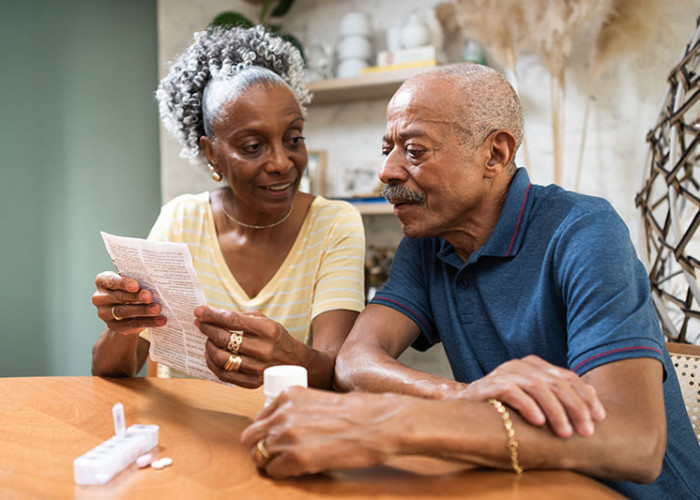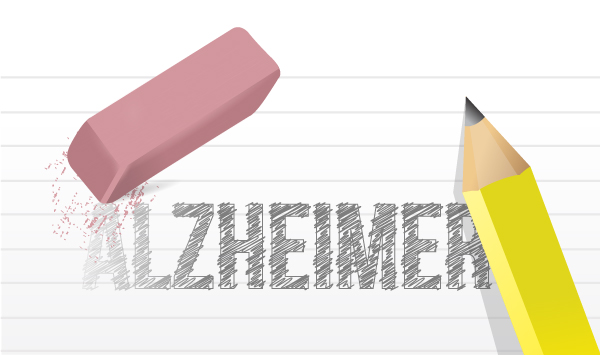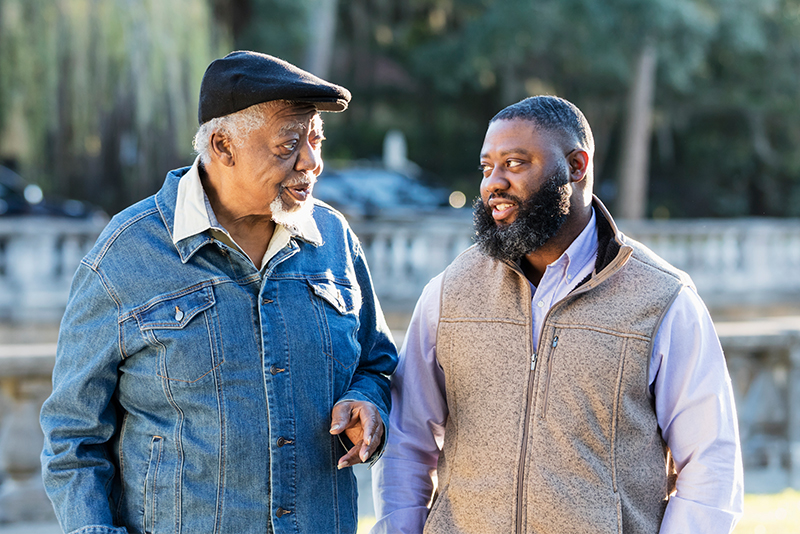Senior Health
Separate Truths From Myths About Hospice Care
Learn some of the most common myths about hospice care and the true facts about this incredibly beneficial form of care.
If you knew that a significantly better quality of life could be achieved for someone you care about, you would not think twice about exploring that option. Yet one of the most beneficial forms of care – hospice – is one that family members shy away from, due to many different misperceptions and myths about hospice care.
Hospice is meant to help someone with a life-limiting illness find respite from pain and other difficult symptoms, while obtaining comfort as well as spiritual and emotional support. Hospice care is provided night and day, both for the individual needing care as well as family members. And, for anyone covered by Medicare, hospice care is offered for a very low … Read More »
How to Overcome Sleeping Problems in Dementia
Try these tips to help someone experiencing sleeping problems in dementia get a better night’s rest.
If it seems like a senior with dementia has completely rewritten the rules on when and how to sleep, you’re not dreaming. For reasons that aren’t yet fully understood, sleeping problems in dementia are quite common. Changes to the senior’s circadian rhythm lead to drowsy days and sleepless nights.
The development of the disease is one contributing factor. Damage to brain cells causes increased weakness, making everyday tasks and activities exhausting. Medication side effects from commonly-prescribed dementia treatments can further exacerbate the issue.
Why Is a Good Night’s Sleep Crucial for a Loved One with Alzheimer’s?
Decreased sleep quality in dementia may bring about an increase in restlessness and delusions, and can cause serious safety concerns, such as the potential for an … Read More »
How to Tell the Difference Between Dementia and Medication Side Effects
With so many similarities, can you tell the difference between dementia and medication side effects?
Disorientation. Confusion. Memory loss. While these are certainly hallmark symptoms of Alzheimer’s disease and other types of dementia, they may also come about from taking certain medications. Before automatically assuming an inevitable diagnosis of dementia, review the following list of prescribed medicines that can cause similar adverse effects in order to help tell the difference between dementia and medication side effects.
The Latest Surprising Facts About Alzheimer’s
The latest surprising facts about Alzheimer’s are changing the way scientists are thinking about what causes the disease.
Surprising facts about Alzheimer’s are surfacing nearly every day, it seems. Take, for instance, amyloid plaques: they’re at the heart of scientists’ hypotheses about what causes Alzheimer’s, and the focus of research is on removing them as an effective treatment option and hopefully, one day, a cure.
Yet a research study led by the University of Cincinnati and in cooperation with the Karolinska Institute in Sweden is turning this thinking upside down. Alberto Espay, the study’s senior author and professor of neurology at UC, shares, “It’s not the plaques that are causing impaired cognition. Amyloid plaques are a consequence, not a cause.”
If Not Amyloid Plaques, Then What?
Espay and the UC team believe the focus should instead shift to … Read More »
The Benefits of a Daily Routine for Seniors
ry implementing a daily routine for seniors who are struggling with physical or cognitive functioning problems.
Life can be full of uncertainties. For seniors who are feeling less in control of particular areas of life, such as losing cognitive or physical functioning, concentrating on what can be controlled is empowering. An excellent way to help is by establishing a daily routine for seniors, personalized to a senior’s particular interests and needs.
Keep in mind that the older adult’s routine is certainly not meant to be a rigid regimen to be adhered to, but simply the basis for predictability and structure. With the older adult’s input and direction, settle on a preferred framework for every day. A sample daily routine may look like this:
Wake up at 7:30 a.m.
Handle personal hygiene needs and get dressed
Enjoy breakfast on the porch while … Read More »
The Harm in Talking to the Elderly Like Babies
We all need to understand how disrespectful talking to the elderly like babies is, and to avoid this common practice.
Watch what happens at the next family members get together when a new mother places her baby in someone’s arms. The person is likely to shift instantly into baby mode: a sing-song, high-pitched voice, exaggerated facial expressions, and overly-simplified speech. Of course, this is quite normal and actually beneficial to an infant’s growing brain. Sadly though, it is also quite common to hear people talking to the elderly like babies too. This can be so harmful to the elderly, that there’s a word to describe it: elderspeak.
A recent research study by Susan Kemper, a professor specializing in gerontology at the University of Kansas, matched senior listeners with younger speakers. Even with the seniors’ instructions just to listen … Read More »
Concerned It Might Be Dementia? Here’s How to Bring It Up to the Doctor.
You may be afraid to talk with the doctor if you’re concerned it might be dementia, but these tips can help.
Distress. Embarrassment. Fear. If you’re concerned it might be dementia, the feelings surrounding a potential diagnosis can force you to keep your suspicions to yourself. An AARP survey peeled away some of the layers of emotion to find the reason – namely, worry over losing independence and becoming a burden to others.
While there is some truth to these worries, there are also some misconceptions fueling them. As an example, roughly 1/2 of the participants, who were adults age 40 and over, believe they’re likely to get dementia as they grow older. The truth is that just over 10% of older adults over age 65 are identified as having Alzheimer’s disease.
Because of this, it’s critical for … Read More »
Unique Dementia Signs to Watch For in Latinos
Learn the distinct dementia signs to watch for in Latinos.
A new study sponsored by the Alzheimer’s Association is uncovering some striking results in how dementia may show differently in Hispanic people. While further research is necessary to fully understand whether these differences are the consequence of social/cultural nuances or the dementia itself, it is beneficial information for Latino families to learn the specific dementia signs to watch for in Latinos.
What Are the Unique Dementia Signs for Hispanic Seniors?
Daily Life Activities
One feature of this research was the dramatically faster decline in the capability to do everyday activities, including walking, getting dressed, and taking a shower, when compared with other ethnicities. Andrea Ochoa Lopez, the University of Houston doctoral student who performed the research, explained that the cultural dedication to caring for older relations can be … Read More »
Not All Alzheimer’s Diagnoses Are the Same!
Alzheimer’s is increasingly common in older adults, but not all Alzheimer’s diagnoses are the same!
For many years, experts have been examining the advancement of Alzheimer’s through one basic model. Yet not all Alzheimer’s diagnoses are the same, presenting with a variety of symptoms and progression rates.
Now, however, a large, new collaborative study between the US, Canada, Sweden, and Korea is revealing some fascinating information to help us more accurately understand and treat Alzheimer’s disease. Rather than one universal, dominant diagnosis of Alzheimer’s, researchers have discovered that there are four unique variants that occur in as many as 18 – 30% of cases. This change in thinking is helping researchers more fully comprehend the variations in the disease from one person to another.
The findings are also significant in that they are allowing specialists to begin to … Read More »
Are the Older Adults You Love Missing Out on These Life-Changing Adaptive Tools?
As many as half of all seniors living at home are not utilizing life-changing adaptive tools.
Consider the many tools you make use of each day – your phone, toothbrush, hairbrush – simple items, but ones you can’t imagine living without. For many seniors, there are basic but life-changing adaptive tools available that could mean the difference between living at home and facing a move to assisted living. Yet almost 50% of seniors living at home are not utilizing these helpful tools – even though costs are minimal.
A recent National Health and Aging Trends Study assessed the ability of older adults to execute tasks such as rising unassisted from a sitting position and walking, and discovered that a large number of the participants could benefit from assistive devices.
Not only that, but the likelihood of older adult … Read More »

















